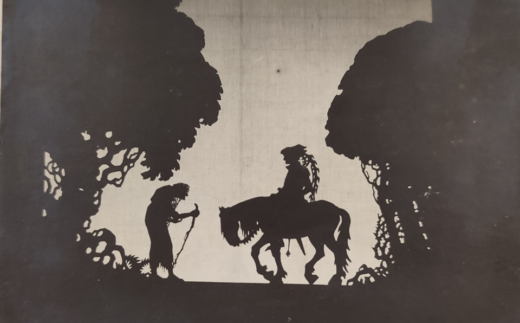
Printed
18 pages
Author(s)
Wolfdietrich und die Rauhe Els
When Alexander von Bernus opened his shadow theatre in 1907 in the artistic neighbourhood of Schwabing in Munich, he wished to present a new form of art, which he explicitly connected with the Romantic tradition. This new form of art would be different from the shows of the Chat Noir cabaret in Paris and make better use of the immaterial quality of shadows to venture into the realms of the soul and of dreams. Mysticism pervaded the intellectual and artistic circles of Munich at the beginning of the 20th century, and it had something to do with this project too, since it aimed at “the most metaphysical union of image, poetry and music”.
Karl Wolfskehl is one of the co-founders of the Schwabinger Schattenspiele, for which he wrote three plays. Wolfdietrich und die Rauhe Els features in the inauguration program of the theatre. Wolfskehl’s plays differ from the oneiric plays of Alexander von Bernus in their themes (most notably the relation between genders) and a darker and more violent atmosphere. The three plays are rewritings of Nordic myths or oriental tales. In the wake of the influential tradition of philology in German universities and of the new dynamic of scientific orientalism at the beginning of the century, Karl Wolfskehl was, above all, interested in those tales as a scholar and a bibliophile. To write Wolfdietrich und die Rauhe Els, he drew on the old Germanic legends, a selection of which had been published in Munich by Richard von Khalil (in 1906). This collection summarises different versions of the legend of Wolfdietrich. Wolfskehl’s play focuses on the chapter entitled « Wolfdietrich und Siegeminne » in which the young knight meets a monstrous mermaid. Instead of the divine intervention that saves the knight in Richard von Kralik’s version, Karl Wolfskehl uses a moral cause: the mermaid’s sudden leniency is caused by the remorse of the knight, who recognises his mistreatment of women.
Thwarted love, obsession, and transformation are expressed in Rolf von Hoerschelmann’s sceneries, where vines, brambles, and roots adorn and surround the scenic space, in a way that is as aesthetic as it is worrying.
A young knight is punished for having dismissed an ugly woman
As he wanders alone in the woods, the knight Wolfdietrich pays tribute to his sword and to his mount, precious allies in his adventures. Suddenly, a monstrous woman calls out to him, and asks him to spend the night with her. When met with an unequivocal and insulting refusal from Wolfdietrich, the woman insists and threatens him, before sentencing him to seven years of sleep. When he awakes, in the same woods but seven years later, he has neither his sword nor his mount, and he has lost his bearings and his senses. The mermaid appears and asks for the same thing again but the young knight refuses again, repelled by her ugliness. Ashamed of being challenged in such a way by a woman, he prefers to ask for his death. The diabolical mermaid refuses, and takes away his sight, his youth and his sanity. Lost and weakened, Wolfdietrich slowly tries to walk, groping around, and singing tirelessly the same refrain about his past achievements. The mermaid loses hope in being one day delivered by the one she loves, and resigns herself to go back and wait for death in her tower next to the Fountain of Youth.
Some time later, she hears Wolfdietrich’s voice as he is being followed by people who threaten to hit him. He wants to know who deprived him of his senses and of his youth. He dwells on his past glory before being reduced to silence, stricken with the mermaid’s provocation. The mermaid dives in the Fountain of Youth where she gets her youth and beauty back, as Wolfdietrich gets his sight back. Now dazzling, she reminds him of his wrongdoings when he was a young and handsome knight. Admitting to his mistakes, Wolfdietrich wants to end his life, and throws himself in the fountain, which gives him his youth, his sword and his mount back. The mermaid rewards him for his remorse, and, now that she has been delivered from her evil spells, she can marry him.
First performance
Schwabinger Schattenspiele
Publications and translations
Karl Wolfskehl, Wolfdietrich und die Rauhe Els, Munich, Schwabinger Schattenspiele, 1907
